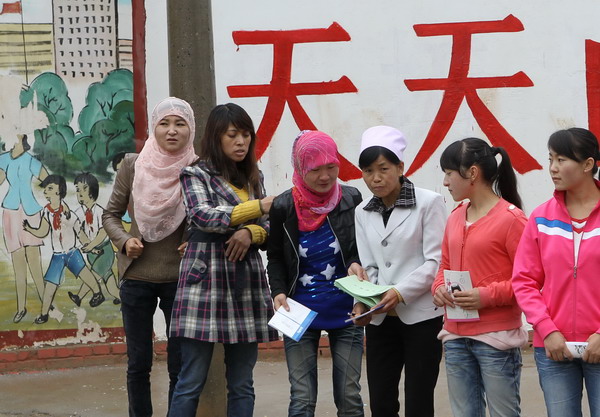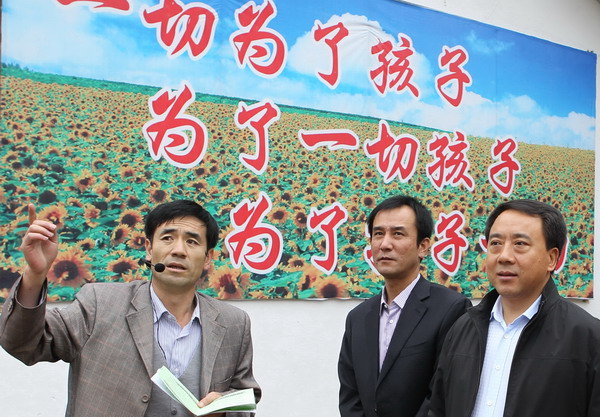Schools provide a class act for success
Updated: 2011-09-28 07:50
By Zhu Zhaoxu (China Daily)
|
|||||||||
English teachers wanted
For a county where 96 percent of the population are farmers with annual per-capita income below 2,000 yuan ($317) in 2010, every cent counts when it comes to running schools.
In the case of Gudu school, a community school better known as Gudu "teaching spot" locally, educational authorities have arranged for Ma and his wife to work at the same facility to cut costs.
The couple and another teacher teach five classes in the only two classrooms available, meaning teaching is done by rotation.
Though English textbooks are given free to the pupils as with other books and tuition the subject is not taught at Gudu school due to a lack of teachers.
Besides Gudu, five other elementary schools in Dashu township do not have an English class. Only four schools in the township of 8,000 folks manage English lessons, usually taught by math or Chinese teachers for two hours a week, according to Ma Jinlong, headmaster of Dashu Central Elementary School.
Education bureau chief Zhang said Dongxiang is apparently not attractive to graduates of English-language institutes.
"We welcome volunteers from English-speaking countries to help us," he said. "Preferably, I hope they stay here for a year or longer, not just for one- or two-month sessions."
English-speaking volunteers stoke great interest of the pupils in the language; but as soon as they leave, the students' interest flags drastically, he said.
They then have to face the stark fact of either having no such lessons or being taught by teachers without adequate skills, Zhang said.
"But if the native speakers stay longer, they could help train our teachers in addition to improving the children's linguistic skills," he said.
|
 Ma Xuemei (third right), a Chinese language teacher for second-graders, poses with her colleagues at Zhaojia Elementary School in Dongxiang. [Photo by Xu Jingxing/China Daily]
|
Boarding schools
While Ma Qidong and his peers at Gudu and other elementary schools can dispense with English as a luxury, they cannot avoid the risk of dropping out of school some day.
 |
This means nearly 4,000 students at the "teaching spots" have to trudge longer distances to attend other schools after finishing their third grade, according to Zhang.
The "teaching spots" are designed to offer the nearest places for younger children to study for three years, after which they are supposed to be able to walk farther to attend "conventional schools", said Zhang.
"That's why building boarding schools is such a priority for us," he said.
Only 17 of 211 elementary and high schools provide lodging, with subsidies going to 9,066 boarders, half of them elementary school pupils, according to bureau figures.
At present there are nearly 60,000 elementary and high school students in Dongxiang.
"Boarding schools are a magnet for children plagued by the daily trouble of walking long distances," Zhang said, adding Dongxiang plans to build 29 such schools by 2015, at least one for each township. But even though a boarding school is available, poverty can be a severe impediment for many families.
Ma Qiyuan, elder brother of Ma Qidong of the Gudu school, stays at home as he suffers from epilepsy that the family cannot afford to treat.
The family lives a five-minute walk from the Gudu school. The mother, Ayingshe, 50, said her 15-year-old son had enrolled in Dongxiang Minzu High School, a boarding school, but 70 yuan a week for transport and food was quite a burden for the family of five.
The Mas' earthen house was knocked down last year because it leaked water when it rained. The township government helped build a brick house for the Mas, in addition to providing 500 yuan a year for each family member.
The Dashu township chief, surnamed Ma (the family name is quite common here), promised the township government would try to help get Ma Qiyuan back to school.
About 108,000 residents, or nearly two in five of Dongxiang's population, claimed government subsistence allowance last year, according to local government sources.
Unlike Ma Qiyuan, who fell ill, Ma Shiming was forced by his mother to quit school two years ago to herd sheep and look after his two sisters aged below 5.
"I begged my mother to let me return to school, but she said she needed help, as father was a migrant worker far away from home," the 14-year-old at Machang Elementary School in Wujia township said.
His teacher, Ma Jinming, called the father several times, imploring him: "You can't write your name and have difficulty even in finding the right bus; do you want your son to end up like you?"
The son promised his mother, if permitted back to school, he would study harder to win as many prizes as possible.
Back at school, he is one of the happiest students; and has won five certificates of honor by grade five.
Gao Shitai, the Dongxiang top official, said the county has left no stone unturned to ensure every school-aged child receives education.
Even with skimpy annual revenue of 45.9 million yuan in 2010, Dongxiang funneled 15 million yuan, or a third of the total, to reward schools, schoolmasters, teachers and students with top performance, he said.
|
 Ma Jianguo (left), headmaster of Zhaojia Elementary, introduces his school to Zhang Xuelong (center), chief of the county's education bureau, and Gao Shitai, Party secretary for Dongxiang. [Photo by Xu Jingxing/China Daily]
|











